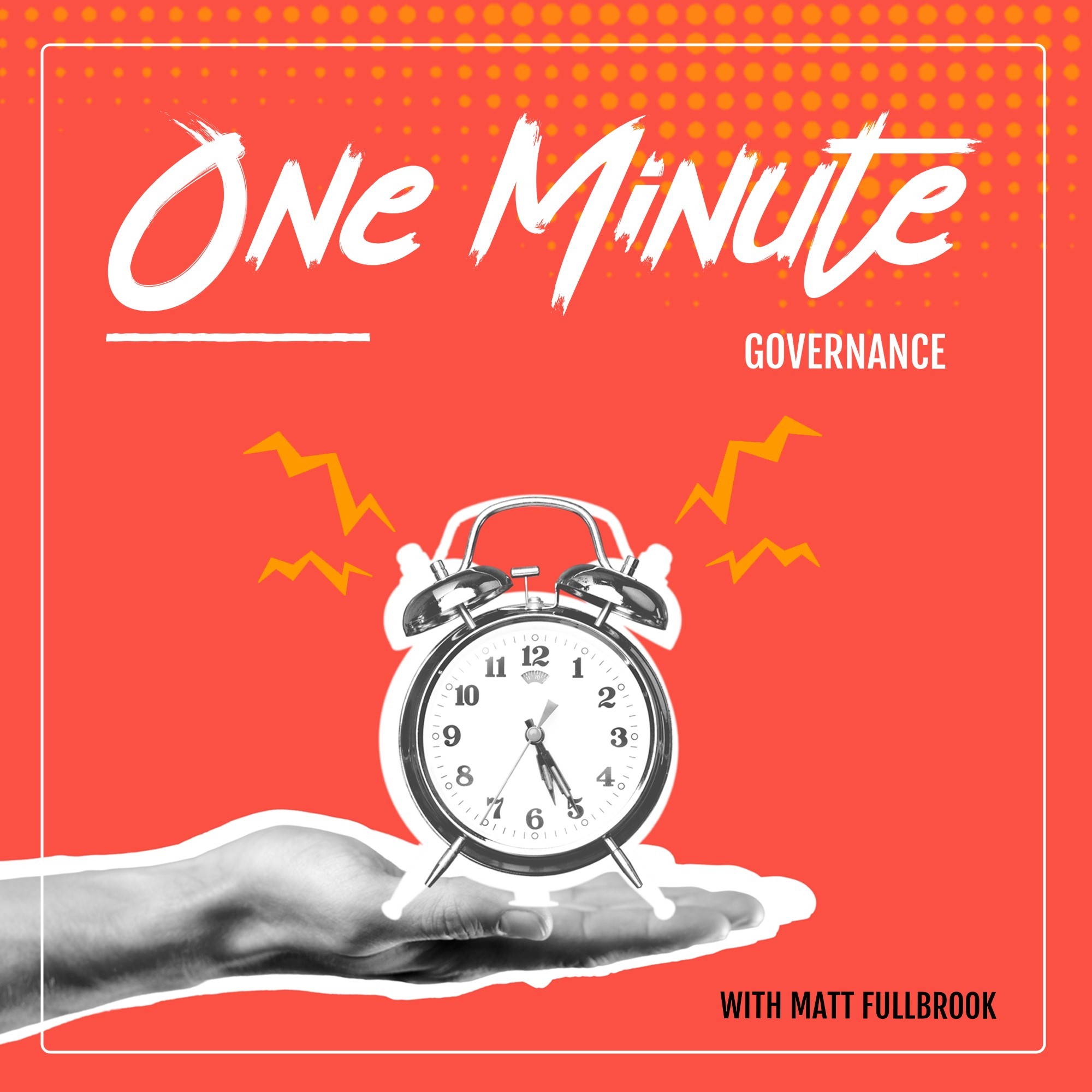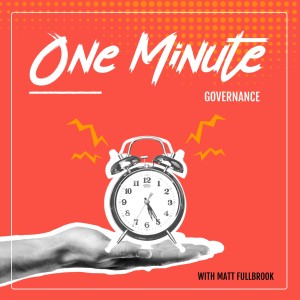
143.9K
Downloads
272
Episodes
Season 5 is live! New episodes every Monday and Thursday. This season, we’re exploring questions that directors need to *answer*. Are you a director, senior executive, investor, or someone who’s just curious about corporate governance? Tune in for insights about how things work inside and outside the boardroom, based on 20 years of experience and interactions with thousands of directors from around the world. Each episode lasts about one minute and will provide you with questions to ask yourself, your board and your management team, designed to optimize the way your organization makes decisions. Matt Fullbrook is a corporate governance researcher, educator and advisor located in Toronto.
Episodes

Monday Jul 29, 2024
Monday Jul 29, 2024
This season, every episode of OMG focuses on a question that directors really need to answer.
OMG is written, produced, narrated and scored by Matt Fullbrook.
TRANSCRIPT:
Question #9: To what extent does every director really understand the business? I’ve been pretty outspoken over the years about my thoughts on board composition. In general, I think boards tend not to be sufficiently open-minded about who “belongs” on boards – I hope you could hear the air quotes there. There’s basically no evidence or consensus that suggests *any* specific type of experience or expertise, or any type of personality or any demographic characteristics might be associated with business performance. This is part of the reason why I prefer to think about governance as being in the world of decision-making, a realm where there *is* plenty of decisive science to help us to understand how we might mess up and what we can do about it. Still, boards fundamentally exist to run corporations, and even if they choose to hire managers and other employees to do the operational work it doesn’t change the fact that boards are responsible for literally everything that happens in an incorporated entity. So, no matter your experience or skillset or personality. No matter who appointed or elected you to the board. No matter what other valuable things you might be bringing to the table, if you don’t understand how the business of the corporation works it’s going to be *really* difficult to be useful as a director. Where does the corporation get money from. Why do its customers or funders choose to give it money? How does the corporation spend money, and why? What are the nuances of its structure, and why are they the way they are? What is the competitive landscape? What does the balance sheet look like and why? Why does the corporation do the things it does and not do the things it doesn’t do? What might kill it? I know this is a podcast episode about one question: “to what extent does every director understand the business?”, but an infinite number of other questions live inside it. Collectively, you should be striving for the answer to this episode’s question to be “to a super frickin great extent, thank you very much.”

Thursday Jul 25, 2024
210. What do we even mean when we talk about "duty?" (Question #8)
Thursday Jul 25, 2024
Thursday Jul 25, 2024
This season, every episode of OMG focuses on a question that directors really need to answer.
OMG is written, produced, narrated and scored by Matt Fullbrook.
TRANSCRIPT:
Question #8: What do we even mean when we talk about “duty?” As in how the word “duty” applies to the work of the board and directors. In the previous episode, I suggested in passing that you might want to ask this question, and now I’m making it a bit more explicit. I can say with reasonable confidence – from my experience, at least – that directors and executives refer frequently to a board’s duties without taking a moment to make sure everyone knows what they’re talking about. Fiduciary duty? Moral duty? Ethical duty? Regulatory compliance? And even once you get that part clear, there’s no guarantee that you agree on what your duties are, or even that your own understanding is rooted in fact. Let me give an example. Here in Canada, if you ask “to whom do you owe your primary fiduciary duty?” most directors will confidently answer “to the corporation.” This is a technically correct, but altogether incomplete answer. Many of the directors who provide this answer are unable to confidently answer the simple follow-up question: “OK, what does it mean to have a duty to the corporation?” The legal answer to this question is simultaneously specific and complex. I won’t give away the punchline, because in addition to being specific and complex, it’s also boring and not useful outside of Canada. In any case, I hope my point is clear. If you’re going to bring up board and director duties, take a second to make sure that everyone knows what you’re talking about, and try to make sure that you, yourself, can explain exactly what discharging those duties might entail. Duty is a loaded word. Let’s make sure we’re walking the walk.

Monday Jul 22, 2024
209. To what extent do we agree on to whom we owe a duty? (Question #7)
Monday Jul 22, 2024
Monday Jul 22, 2024
This season, every episode of OMG focuses on a question that directors really need to answer.
OMG is written, produced, narrated and scored by Matt Fullbrook.
TRANSCRIPT:
Question #7: To what extent do we agree on to whom we owe a duty? I’ve been blabbing on about this in some form or another for more than 10 years. It’s been the subject – directly and indirectly – of a bunch of OMG episodes going back to episode 4. Still, I’ve never been disappointed by a boardroom discussion about who stands to be affected by our decisions and, among those who are affected, to whom do we owe the greatest duty. Notice that I’m talking about who is affected rather than just talking about who benefits. There’s no decision a board will ever make that is universally good for every affected party. Life is trade offs. When I wrote that sentence it seemed so obvious that it must have been said or written by someone famous somewhere. Turns out it’s seemingly been said or written by everybody ever, because it’s so true. Anyway, whenever your board needs to engage in a decision of any consequence, taking a few minutes to think about the individuals and groups – both inside and outside the corporation – that stand to be affected, and then taking another few minutes to ask “among these affected parties, to whom do we owe the greatest duty?” You can even take the whole list and rank them. You might even take a few minutes to decide what, exactly, you mean by the word “duty.” Anyway, that 15ish minute conversation is likely to be your best use of time in the whole meeting.

Thursday Jul 18, 2024
208. Have we empowered our directors to do a great job? (Question #6)
Thursday Jul 18, 2024
Thursday Jul 18, 2024
This season, every episode of OMG focuses on a question that directors really need to answer.
OMG is written, produced, narrated and scored by Matt Fullbrook.
TRANSCRIPT:
Question #6: Have we empowered our directors to do a great job? It’s one thing to define what doing a great job means, like we did in the last episode. It’s a whole nother thing to figure out what it takes to empower every individual in the room to feel like they can do a good job without too many obstacles. Obstacles come in countless shapes and sizes, so let’s use an example to illustrate. Let’s say we’ve decided that one of the things that makes a director great is their willingness and ability to change their mind when presented with new and relevant information. Some obstacles here are nearly invisible, like confirmation bias, which is a quirk of human cognition that causes us to overvalue information that tells us we’re right…even if that information isn’t reliable or accurate. So, you can see how confirmation bias might make it hard for someone to change their minds based on new information. Other obstacles might be social, like the fear of looking or feeling like a hypocrite or seeming indecisive or doubtful. You can also imagine the time constraints of a board meeting might make people less likely to even want to consider new information in the first place, let alone to take the time to question their beliefs. In other words, empowering directors to be great might require us to be intentional about information, time allocation, social dynamics, personality management, and more. But we won’t know exactly what to be intentional about, or how, if we don’t take the time to learn about each other’s preferences and expectations. Hence this week’s question. Another way to put it is: what would it take for *you* - and each of the other people in the room – to feel comfortable, and even excited to do the things that make a director great?

Monday Jul 15, 2024
207. What, specifically, makes a director great? (Question #5)
Monday Jul 15, 2024
Monday Jul 15, 2024
This season, every episode of OMG focuses on a question that directors really need to answer.
OMG is written, produced, narrated and scored by Matt Fullbrook.
TRANSCRIPT:
Question #5: What, specifically, makes a director great? Last episode we asked what board effectiveness looks like under normal circumstances. It kinda goes without saying that an important and related question is what makes a director great. As in, what are some specific differences between a great director and a not-so-great director? We talk a lot about the skills and maybe even competencies that we want. We probably even talk a lot about how we might go about baking those into the way that we recruit directors. You know, the whole skills matrix thing. In most cases, though, the skills matrix doesn’t have anything to say about the stuff that actually makes someone a good director. For instance, let’s imagine we all agree that we want an experienced CEO on our board. I bet we can all also agree that just being a CEO isn’t enough to make someone a great director. But what *would* make them great? Is it active listening? Willingness to change their mind when presented with new and relevant information? Kindness? Courage? A pleasant singing voice? And don’t get distracted by any research that claims to find any connection or lack of connection between board composition and financial performance. There are all kinds of reasons those studies are flawed. That’s why we’re trying to cultivate effective conditions for our decisions instead of using our skills matrix to directly affect, say, share price. So, ask and answer the question. Then think about how to recruit directors for what actually makes them great.

Thursday Jul 11, 2024
206. What does board effectiveness look like on a normal day? (Question #4)
Thursday Jul 11, 2024
Thursday Jul 11, 2024
This season, every episode of OMG focuses on a question that directors really need to answer.
OMG is written, produced, narrated and scored by Matt Fullbrook.
TRANSCRIPT:
Question #4: What does board effectiveness look like on a normal day? We – and by “we” I mean people who talk about corporate governance – have a tendency to talk about the impact of boards through examples of massive failure. Whether it’s Enron or Boeing or Wells Fargo or Theranos or the Challenger space shuttle explosion, we feel compelled to highlight all the ways things might go really wrong, but then we forget one tiny important thing: most boards aren’t in crisis most of the time. So, what does it mean to show up to a regular old board meeting and do a great job? It’s obviously really important to acknowledge how bad things can get, how important the role of the board can be in navigating potential catastrophes, and why it’s helpful to have some anxiety about how things might go wrong. But I think we can all agree that a board’s job is way more than catastrophe avoidance. So, when we show up for the next board meeting, what might great look like? Maybe we don’t even have any consequential decisions to make. Maybe we have every reason to believe that our organization’s future likely to be very bright. And maybe we’ve already done all the work we can do to acknowledge and manage potential catastrophes. So, when a normal meeting wraps up, what would cause us to look back and say “holy smokes! The board absolutely killed it today!” Sure, for some people, it might involve imagining new ways that things might go wrong so that we can be prepared for the worst. For other people it might involve dreaming about how to get even better. But being specific helps. What’s the right tone? What are the right conversations? What would it take to increase the probability that everyone is engaged and participating? How can YOU, individually, be as useful as possible? But if we don’t make an effort to describe board effectiveness under normal circumstances, we’re not likely to get it done.

Monday Jul 08, 2024
205. What is our agreed-upon definition of good governance? (Question #3)
Monday Jul 08, 2024
Monday Jul 08, 2024
This season, every episode of OMG focuses on a question that directors really need to answer.
OMG is written, produced, narrated and scored by Matt Fullbrook.
TRANSCRIPT:
Question #3: What is our agreed-upon definition of good governance? Don’t worry, this episode isn’t just me saying “blah blah intentionally cultivating effective conditions blah.” As much as I like my definition of good governance and find it both useful and empowering, I’m under no illusions that *you* couldn’t come up with something better. Nonetheless, I am highly confident that most directors, executives and governance professionals can’t describe good governance in a way that is both easy to understand and DO-able. And that’s the problem with most of the definitions of good governance that are out there: they don’t give you any idea how to actually get it done! This is also my main gripe with the common temptation to define good governance based on results. As in, I dunno, you know you have good governance when you’ve convinced all your employees to wear funky sunglasses to work every day, or whatever. As if it doesn’t matter if you achieved it by providing free access to irresistibly-funky sunglasses or by blasting people’s workspaces with blindingly bright lights. What I’m saying is that it’s the process that matters! Anyway, if you don’t have a clear, confident and shared definition of good governance, then how the heck do you expect to actually DO good governance? And, if you’re struggling to come up with your own idea, then sure feel free to borrow mine. If you’re having trouble agreeing with each other, then maybe agree to disagree by choosing a “good enough” definition and see what it feels like to live with it for a few meetings. Use it to inform and guide everything from information flow to time allocation to conversation structure to room layout. The worst answer to this question is “we don’t have one.”

Monday Jul 08, 2024
Monday Jul 08, 2024
This season, every episode of OMG focuses on a question that directors really need to answer.
OMG is written, produced, narrated and scored by Matt Fullbrook.
TRANSCRIPT:
Question #2: What is our agreed-upon definition of corporate governance? If you’re at all familiar with my Ground-Up Governance platform, then you know I’m kinda obsessed with definitions. I’ve said before that I think the most important and insidious jargon in the world of corporate governance is the term “corporate governance.” How many times have you heard corporate leaders complain about boards crossing the line from “governance” to “operations?” A significant part of the reason this happens is because nobody agrees what “governance” even is. I attended a panel discussion earlier this year where the three panelists were talking about boards and AI. The definition police part of my brain quickly fixated on the fact that each panelist meant something different when they said the word “governance.” One was clearly referring to the rules imposed by the stock exchange and regulators. Another seemed to be using the word “governance” to talk about board composition. And the third was talking about the structure of board meetings. It was a good enough discussion, but imagine how much more clarity and coherence there might have been if the moderator had said “for the purposes of this discussion, I would like us to think of corporate governance as [fill in the blank].” Instead, everyone just kinda went along with this weird assumption that they were all on the same page. Now, in a boardroom this matters even more. I suspect all of your directors and executives can easily agree that an important part of their job is corporate governance. But I have an even stronger suspicion that they don’t have a confident consensus about what corporate governance even is. And it’s hard to do something – and do it well – if we can’t even define it! Especially if we’re all pushing and pulling in slightly different directions without realizing.

Monday Jul 08, 2024
203. Why do we do things the way we do? (Question #1)
Monday Jul 08, 2024
Monday Jul 08, 2024
This season, every episode of OMG focuses on a question that directors really need to answer.
OMG is written, produced, narrated and scored by Matt Fullbrook.
TRANSCRIPT:
Question #1: Why do we do things the way we do? No matter how confidently and aggressively your shareholders, regulators, governance consultants and board educators might say otherwise, there is no decisive evidence and no consensus that any specific approach to doing board stuff is any better than any other approach. If you take a step back and really think about all of the things your board and executives do in service of corporate governance, not to mention all the conditions that we covered last season, one thing should become clear: most of it is optional. Sure, there are some things that are legally mandated, and other non-fungible rules that will get imposed on you from external authorities. But you even have a lot of flexibility when it comes to how you follow those rules…in most cases, at least. More importantly, all the stuff that’s NOT mandated is optional by definition. That means you have freedom to change. And having the freedom to change means it’s important – and powerful – to ask why we do things the way we do? In some cases, you’ll quickly realize that there’s actually no reason at all. You just do things because it’s the way they’ve always been done. In other cases there will be an identifiable and memorable origin, and maybe even a rationale. But no matter what, asking the question is important. If you’re looking for a place to start with your questioning, just look through last season’s conditions. Use the question format “why do we do [blank] the way we do?” where [blank] is one of the conditions. The fact is, you’re probably doing a bunch of optional stuff with no evidence that it works well, and can’t even remember why you’re doing it in the first place. That means you can ask an even more fun question next: “what might better look like?”

Monday Jun 24, 2024
TRAILER: OMG Season 5 launches July 8th
Monday Jun 24, 2024
Monday Jun 24, 2024
New episodes of One Minute Governance every Monday and Thursday starting July 8th. This season's theme is "Questions boards and directors really need to answer."
As usual, this podcast is written, produced and scored by Matt Fullbrook. To connect with Matt, head to www.mattfullbrook.com
TRANSCRIPT:
Hi everyone, I’m Matt Fullbrook. Season 5 of One Minute Governance kicks off Monday, July 8th with episodes twice a week for the next six months or so. Ever notice that we’re always telling directors to ask more questions? About seemingly everything! Wanna do an awesome job at AI oversight? Ask a bunch of questions! Wanna make sure your executives are meeting their performance objectives? Ask a bunch of questions! Want everyone in the room to think you’re super smart and paying attention? You got it: more questions! This line of thinking is so super prevalent that you can type “questions boards should ask” into Google and basically every governance-related organization has put out somewhere between one and 10 million articles encouraging directors to ask questions about this or that. Here’s the thing, though: asking questions doesn’t really matter unless you’re doing it for a good reason. Are you trying to start a conversation? Are you trying to redirect the board’s energy into a more productive direction? Is something truly unclear? Because what actually matters is what the question accomplishes, not the question itself. Which brings us to the headline of OMG Season 5: “50 questions boards and directors really need to answer,” because by answering these questions, you’ll get closer to good governance. Each episode will be about a single question, with a bit about why the questions – and, more importantly, the answers – matter. If you find yourself enjoying this season, please do all the normal and super helpful things that support podcasters: subscribe, leave a review, and tell your friends. And if you’re a director or executive and you’d like an ally in exploring some of these questions, head over to mattfullbrook.com and send me a note. It’s good to be back.

Wednesday Apr 03, 2024
BONUS: Why do corporate governance consultants mostly suck?
Wednesday Apr 03, 2024
Wednesday Apr 03, 2024
Please note that the title is *not* "why do most corporate governance consultants suck."
Matt tries to figure out why corporate governance advice mostly doesn't work, talks about Beyonce, Benson Boone, Nine Inch Nails, Outkast, and a bunch of other stuff.
Full transcript available here: https://groundupgovernance.substack.com/p/bonus-podcast-why-do-corporate-governance
Playlist of songs referenced: https://open.spotify.com/playlist/0tUKlES6lyQ1KVghsVqfTF?si=ec1369c3f0cd4fac
Thumbnail image generated by DALL-E based on the prompt: "A regular person listening to Hey Ya by Outkast and realising - to their great surprise, since they've heard the song a million times and never noticed - that the chorus melody clashes with the guitar chords"

Saturday Feb 10, 2024
BONUS: Good governance is woke - and that's good news for everyone
Saturday Feb 10, 2024
Saturday Feb 10, 2024
If you're a fan of One Minute Governance or Ground-Up Governance, you know that Matt is a bit obsessed with definitions. Turns out that when we have clear definitions for a few important concepts, good governance turns woke. And that's good news for everyone.
Adorable image of a guitar pedal created by DALL-E.
FULL TRANSCRIPT HERE: https://groundupgovernance.substack.com/p/bonus-good-governance-is-woke-and

Thursday Dec 28, 2023
BONUS: Good corporate governance does not cause good corporate performance
Thursday Dec 28, 2023
Thursday Dec 28, 2023
One of the most enduring myths about corporate governance is that we should be able to find a measurable causal relationship between good governance and good performance. I think it's futile.
FULL TRANSCRIPT HERE: http://groundupgovernance.substack.com/p/bonus-good-corporate-governance-does

Thursday Nov 30, 2023
Thursday Nov 30, 2023
Ever feel like most corporate governance resources are...just not that awesome? Ever wonder why the heck they aren't better? Matt Fullbrook has, too.
In another long-ish scripted episode, Matt explains that he thinks he's figured out what's going on here...and also talks at length about Rolling Stone's top 500 albums of all time. It all (mostly) makes sense. Promise!
Full transcript here: http://groundupgovernance.substack.com/p/another-bonus-podcast-what-corporate

Thursday Nov 09, 2023
BONUS: Good governance is basically about feelings (long story alert!)
Thursday Nov 09, 2023
Thursday Nov 09, 2023
This is the first and only episode of its kind. A long scripted story about life, death, snacks, Reconciliation, feelings, The Matrix, the desert, and good corporate governance.
FULL TRANSCRIPT HERE: http://groundupgovernance.substack.com/p/bonus-podcast-good-governance-is
